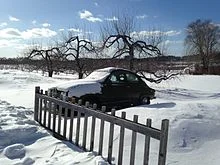What makes a New Englander?
Apple orchard in Hollis, N.H.
From a 2002 commentary by the Voice of America
Every region of the United States has its bittersweet stereotype. People from the American West are reputed to be long of limb, folksy, at home with nature. Those from the Midwest are solid, corn-fed, plain-speaking "heartlanders." "Yankees", who hail from the older, more settled regions of New England in the northeastern United States, are said to be stubborn people of few words.
Ninety-two-year-old Ruth King-Sanborn sits on a horsehair couch overlooking the hardscrabble New Hampshire farm and mill her ancestors bought back in 1773, when this part of the world was still a remote British colony. But don't ask her to get too emotional about the place.
"New Englanders are loath to discuss their feelings. I think the first thought that occurs to me is that people kept their thoughts to themselves. People did not say that they feel bad about something. I'm using the past tense now. I think it was the isolation. We were isolated here. If I didn't go to school, it would've been weeks when I wouldn't have seen anybody outside of the family!" she said.
Colin Cabot and his wife recently bought the farm and mill from Ms. King-Sanborn's family, hoping to restore it. Before moving here, the couple had lived in a small farming community in the rural Midwest. That was a place where people tended to spend time only with their own religious and ethnic kind.
"… and there it is very clearly either Catholic or Lutheran, and the Catholics and the Lutherans don't talk to each other very much. And they can live across the street from each other, and they don't like it. So when I came to New Hampshire, I thought I'd have the same kind of farming community. But the difference is the New Englanders are individualists, they are completely independent. There may have been political differences or religious difference before the Revolution back in 1770. And now, those differences are forgotten, but the fact is they know they are different than their neighbor. And it doesn't take any specific form, but that's not the way I do it," Mr. Cabot said.
To underscore this idea, Mr. Cabot points to the dented New Hampshire license plate on his pick-up truck. It bears the state motto: "Live Free or Die."
"Yeah, right. Some people say the real Yankees are the way they are because they didn't leave when everyone else went away and therefore they are sort of the cantankerous ones, because they could have gone to the Midwest and made a killing. They were insane and stubborn then, and they are more stubborn now because the genes have been perpetuated," he said.
Not everyone feels that way.
"Sometimes people think of Yankees as being cantankerous [grouchy] [and] as being a little bit aloof. But in fact, that is not the case at all. It's just that people are very thoughtful, they do want to make up their own minds."
That's Jean Sheheen, the {then} governor of New Hampshire. She is proud of the legendary independent-mindedness of people in her state, which is on national display every four years during the early days of American presidential campaigns.
"People are used to having candidates for president come through their living rooms and having the opportunity [to talk with them], and I think many people feel like they have the right to ask those people why they are running for president and what they want to do and challenge their thoughts and their issues. And that's good for the democratic process in this country," Ms. Sheheen said.
Norman Macintyre, who runs a fish auction up in Portland, Maine, to the north of New Hampshire, agrees that his fellow New Englanders tend to keep their own counsel. But he adds that they are also very supportive of each other.
"My example for that is the ice storm we had in the winter of 1997 and 1998. There was very severe ice storm here. Many people were out of power for two weeks or more. Shelters opened up immediately. Teenagers went to work in the shelters just volunteered automatically. You would find ads in the newspaper that said 'I have a generator, I've got my power back. If someone wants to borrow my generator, just call such and such a number.' There was no looting. There was no theft. There were no crimes against the public during that period. Whereas, if it was in South Central Los Angeles, I think it would have been different," he said.
Some predict the demise of the traditional crusty New England personality, due to the influence of global media and the influx of immigrants to the region. But this outcome is far from certain. Even Robert Frost, the quintessential Yankee poet, expressed competing sentiments about this in the same poem. He wrote, "Good fences make good neighbors." But he also wrote, "Something there is [in us] that doesn't love a wall."
